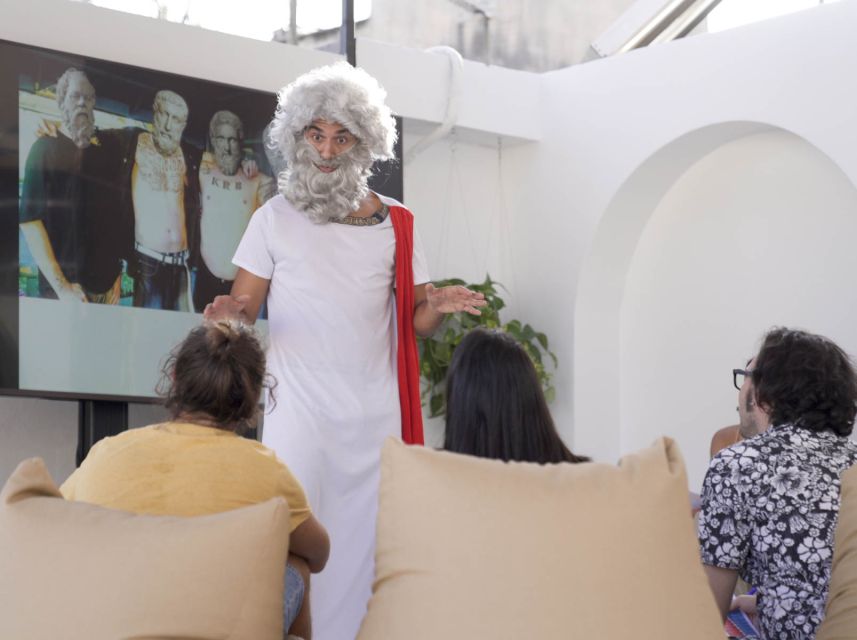Sex Drugs & RocknRoll in Ancient Greece
Exploring the world of ancient Greece unveils a tapestry of indulgence and artistic expression that laid the groundwork for modern Western culture. Within this realm, the convergence of sexuality, intoxicants, and creative pursuits created a dynamic landscape where boundaries blurred and norms shifted. From the symposiums to the raucous celebrations honoring Dionysus, the god of wine, these ancient practices provide a fascinating glimpse into a society unapologetically embracing pleasure and uninhibited self-expression. Delving into the intertwined realms of sex, drugs, and music in ancient Greece offers a captivating journey through a civilization that reveled in the ecstasy of life.
Key Points

- Homosexuality and excess in festivities were embraced.
- Dionysian festivals featured wild revelry and music.
- Alcohol and substances were used in rituals and leisure.
- Pottery and sculptures depicted daily life and myths.
- Legacy includes philosophical foundations and democratic principles.
Here's some more nearby activities we've reviewed
Ancient Greek Sexuality
Ancient Greek sexuality was a complex and intriguing aspect of their society, encompassing various norms, practices, and beliefs that differed significantly from contemporary views.
In ancient Greece, sexuality was not confined to heterosexual relationships but included a wide acceptance of homosexuality and bisexuality. The Greeks viewed love and sexual desire as natural and celebrated through various forms of art, literature, and rituals.
On top of that, nudity was a common practice in athletic events and certain social gatherings, symbolizing freedom and beauty.
The role of women in ancient Greek sexuality was often restricted to the household, while men had more freedom to explore their desires openly.
Understanding ancient Greek sexuality provides valuable insights into the cultural and social dynamics of this fascinating civilization.
Hedonistic Revelries

Exploring the hedonistic revelries of ancient Greek society unveils a world filled with extravagant feasts, wild celebrations, and uninhibited indulgence in pleasure.
The Greeks, known for their love of excess, would often partake in lavish banquets where copious amounts of food and wine flowed freely. These feasts were not just about sustenance but were also a way to display wealth and social status.
Plus, Greeks engaged in symposiums, intellectual gatherings that often turned into raucous drinking parties. These events provided opportunities for philosophical discussions, music, and entertainment, all enjoyed in an atmosphere of indulgence.
The hedonistic lifestyle of ancient Greece was a reflection of their belief in enjoying the pleasures of life to the fullest.
Dionysian Festivals

The Dionysian Festivals in ancient Greece were vibrant celebrations honoring the god of wine, fertility, and ecstasy.
These festivals, held in honor of Dionysus, were characterized by wild revelry, music, dancing, and theatrical performances.
The most famous Dionysian festival was the Greater Dionysia, held annually in Athens, featuring dramatic competitions where playwrights showcased their works.
Participants, often in a state of intoxication, would engage in uninhibited behaviors, breaking free from societal norms.
The festivals were a time of liberation, where individuals could express themselves freely and indulge in excesses.
Sacrifices, processions, and feasting were also common during these celebrations, symbolizing the abundance and fertility that Dionysus represented in ancient Greek culture.
Taboos and Norms
During the Dionysian Festivals in ancient Greece, participants often pushed the boundaries of societal norms, shedding light on the taboos and norms prevalent in their culture. The ancient Greeks had a complex set of taboos and norms that governed various aspects of their lives. Here is a table highlighting some of the key societal norms and taboos in ancient Greek culture:
| Taboos | Norms |
|---|---|
| Incest | Hospitality and Xenia |
| Adultery | Respect for the Gods |
| Cannibalism | Gender Roles |
These taboos and norms played a significant role in shaping the behavior and interactions of individuals within ancient Greek society.
Music and Entertainment
Ancient Greek society indulged in a vibrant array of musical performances and entertainment events that captivated and engaged both the elite and the common people.
Music played a significant role in various aspects of Greek life, from religious ceremonies and theatrical performances to social gatherings and festivals. The Greeks enjoyed a wide range of musical instruments, including lyres, flutes, and drums, with music often accompanying poetry and dance.
The theater was a central hub for entertainment, with tragedies and comedies being popular forms of artistic expression. Festivals like the Dionysia celebrated music, dance, and drama, bringing communities together in joyous celebrations.
Substance Use in Antiquity
Substance use in antiquity reveals a complex tapestry of practices and beliefs that intertwined with various aspects of ancient cultures worldwide.
In ancient Greece, alcohol consumption was prevalent in social gatherings, with wine playing a central role in religious ceremonies and daily life. The Greeks also used various substances for medicinal and recreational purposes, such as opium and cannabis. Plus, substances like mandrake were believed to possess magical properties and were used in rituals.
In Egypt, beer was a common beverage, and the ancient Egyptians brewed a wide variety of alcoholic drinks.
Across different civilizations, substances were often linked to religious rituals, social customs, and even medical treatments, showcasing the diverse ways in which substances were integrated into ancient societies.
Artistic Expressions
Artistic expressions in the cultural landscape of antiquity served as vibrant reflections of societal values and beliefs.
In ancient Greece, art played a significant role in capturing the essence of daily life, mythology, and spiritual beliefs. From the intricate pottery designs depicting scenes of everyday activities and mythological tales to the grandeur of sculptures honoring gods and warriors, art served as a means of expressing beauty, power, and cultural identity.
Greek theater, with its tragedies and comedies, provided a platform for exploring complex emotions and moral dilemmas. Through art, ancient Greeks showcased their appreciation for harmony, balance, and the celebration of human form, laying the foundation for the artistic traditions that continue to influence the world today.
Legacy of Ancient Greeks
The enduring impact of Greek civilization resonates through various facets of modern society, encompassing realms beyond art and artistic expressions. The legacy of the ancient Greeks can be observed in fields such as philosophy, democracy, and language. Here is a table illustrating some key aspects of the legacy of the ancient Greeks:
| Field | Contribution |
|---|---|
| Philosophy | Foundation of Western philosophical tradition |
| Democracy | Development of the concept of democratic governance |
| Language | Influence on vocabulary and structure of many languages |
These contributions continue to shape our world today, highlighting the profound and lasting influence of ancient Greek culture on contemporary society.
Here's a few more nearby tours and experiences we have reviewed.
- Athens Private Full Day Guided Tour (Up to 15 in a Luxurious Mercedes Minibus)
- Private Tour Mycenae Nafplio Nemea Wine & Food Tasting 8 Hour
- Meteora Monasteries & Thermopylae – Private Full Day Tour From Athens
- Cape Sounio
- Delfi Full Day Private Sightseeing Tour
- Greece 5-Day Mountain Adventure With Meteora and Delphi (Apr )
Common questions
Were Ancient Greeks Open About Their Sexuality?
Ancient Greeks were notably open about their sexuality, embracing diverse expressions of love and relationships. Greek culture celebrated both heterosexual and homosexual relationships, with nudity in art and athletic competitions further reflecting their comfort with the human body.
What Substances Were Commonly Used in Ancient Greece?
Common substances used in ancient Greece included wine, which played a significant role in social gatherings and religious ceremonies. Olive oil was also prevalent in cooking and skincare. Plus, the Greeks utilized herbs like mint and thyme for medicinal purposes.
How Did Music Play a Role in Greek Celebrations?
Music in ancient Greece played a significant role in celebrations, serving as a vital element in religious rituals, festivals, and theatrical performances. It was believed to have the power to evoke emotions, enhance storytelling, and connect individuals with the divine.
What Were the Taboos Surrounding Nudity in Ancient Greece?
In ancient Greece, nudity was a common sight in public spaces, with athletes, artists, and even philosophers often appearing unclothed. However, societal taboos surrounded the exposure of certain body parts, particularly female breasts, which were considered inappropriate.
What Is the Legacy of Ancient Greek Hedonistic Practices?
The legacy of ancient Greek hedonistic practices lies in shaping modern views on pleasure, freedom, and individual expression. These practices influenced art, philosophy, and cultural norms, leaving a lasting impact on societal values and perceptions of personal fulfillment.
Here's more of our most recent tour reviews happening neaby
- Athens: Bike Tour of Athens Historical Centre
- Athens: Kotsanas Ancient Greek Technology Museum Guided Tour
- Explore the Hidden Food Gems of Athens
- Acropolis: Evening Tour With a German-Speaking Guide
- Athens: Cape Sounion Afternoon Tour
- Athens: Peloponnese Highlights Day Trip and V.R. Audio Guide
- Athens: Night Walking City Tour in English or Spanish
- From Central Athens to Athens International Airport
- Athens: Private Mythology Treasure Hunt W Food Stops
- From Athens: Half-Day Ancient Corinth Tour
- Athens: Acropolis Guided Walking Tour & Plaka Audio Tour
Last Words
To sum it up, the hedonistic lifestyle of ancient Greece, characterized by lavish banquets, Dionysian festivals, and uninhibited behaviors, left a lasting impact on Western civilization.
The open discussions on sexuality, acceptance of diverse orientations, and the interplay of music, dance, and theatrical performances have shaped cultural norms and artistic expressions for centuries to come.
The legacy of the ancient Greeks in embracing sensuality, substance use, and artistic freedom continues to influence modern society.
More Great Things To Do Nearby